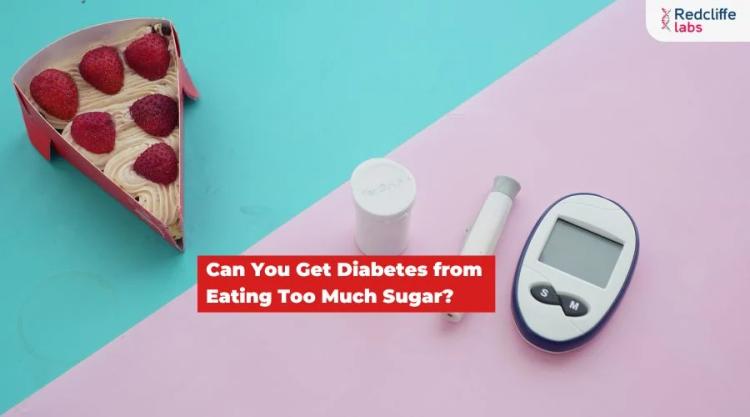Recognizing Symptoms for HbA1c Testing: When to Check Your Blood Sugar Levels

Medically Reviewed By
Dr Sohini Sengupta
Written By Kirti Saxena
on Oct 23, 2023
Last Edit Made By Kirti Saxena
on Jan 8, 2025

Whether you're already managing Diabetes or want to stay on top of your health, knowing your HbA1c levels is essential. Hemoglobin A1c or HbA1c is a blood test that checks your average blood sugar levels over the past two to three months. The test has a significant role in diabetes management and risk assessment. It will help you understand how well you control your blood sugar and whether you might be at risk of Diabetes.
If you're wondering when to get tested for HbA1c, it's important to understand what this test measures and what symptoms indicate its need. This blog is for you. Let's dig into the topic to understand more about it. So, let's get started.
What is an HbA1c test?
Also known as Hemoglobin A1c Test or Glycated Hemoglobin Test, the HbA1c test calculates the average blood sugar levels for the past two or three months. The test is significant in diagnosing, monitoring, and managing Diabetes, particularly Type 2 Diabetes. While helping measure the HbA1c levels, the test may help manage Diabetes by allowing one to adjust treatments as necessary. So, now the question is, when do you need to measure these levels? What symptoms indicate the need for the test? Scroll down to learn more.
What does this test measure?
The test measures average blood sugar levels over the past 2-3 months. It assesses the percentage of hemoglobin in the blood with glucose molecules attached to it to help diagnose and manage diabetes. Elevated HbA1c levels indicate poorer blood sugar control, while lower levels suggest better control. Monitoring HbA1c is essential for understanding how well diabetes is managed and assessing the risk of diabetes-related complications.
Symptoms that indicate the need for an HbA1c Test:
You may need an HbA1c Test if you are exhibiting the classic symptoms of Diabetes, such as:
- Dry skin
- Excessive thirst
- Feeling very hungry
- Frequent urination
- Unexplained weight loss
- Blurred vision
- Extreme fatigue
- Sores that heal slowly
- Numb or tingling hands or feet
- Having more infections than usual
All these symptoms are usually linked with Diabetes, and getting tested in time is critical to confirm the condition and take charge of the health while there is still time. Besides helping you diagnose Diabetes, the test may also help monitor and manage the condition well.
Besides these symptoms, there are some other reasons one may need HbA1c Test, such as:
Risk Factors That May Prompt The Need For An A1c Test
- Have A Family History Of Diabetes: Your genes significantly contribute to your risk of developing Diabetes. Therefore, having a family history of Diabetes is one major factor that prompts the need for HbA1c tests. Getting tested may help with early diagnosis that ensures effective condition management.
- Obesity: Being overweight is another factor contributing to a high risk of developing Diabetes. It is because excess body fat, especially around the abdomen, can lead to insulin resistance, where cells in the body do not react to insulin, increasing blood sugar levels and risk of Diabetes.
- Chronic Health Condition: Individuals with existing health conditions, like high blood pressure or high cholesterol, are more at risk of Diabetes and may need timely diagnosis to monitor the levels and manage the condition well.
- Poor Diet: Your dietary choice is another factor that contributes to a high risk of Diabetes, and getting tested is essential for accurate diagnosis. It will make you aware of your condition, allowing timely changes in the diet that can keep your blood sugar levels in check.
- Sedentary Lifestyle: Individuals leading a sedentary or inactive lifestyle are also at more risk of Diabetes and may need an HbA1c Blood Test to assess their risks.
- Gestational Diabetes History: If you have had gestational Diabetes, you may need an HbA1c Blood Test to track blood sugar levels, as the condition may increase your risk of Diabetes.
- Have PCOS: PCOS, also called Polycystic Ovary Syndrome, increases one's risk of developing insulin resistance and type 2 diabetes. Therefore, individuals experiencing irregular periods, acne, excess hair growth, or other symptoms associated with PCOS may need an HbA1c test to assess their risk.
- Prediabetes: Moreover, individuals previously diagnosed with pre-diabetes may need an HbA1c test to monitor changes in the blood sugar levels to confirm how well the condition is managed or requires any adjustments.
- Routine Monitoring: Lastly, the HbA1c Test is also recommended as a part of routine health checkups to monitor the condition, allowing better management as needed.
Remember, no matter the reason, getting tested in time is essential to confirm or rule out the risk of Diabetes so the condition can be managed in time.
Also Read: If you still have doubts about the test and what would be the right time to get tested, you should also read this -
Conclusion:
HbA1c testing helps diagnose and manage Diabetes. If you have any doubts about your blood sugar levels or risk factors, it's important to consult with a doctor so that they can guide you when and how often to get tested.
Reach Redcliffe Labs For HbA1c Screening
If you are looking for a reliable diagnostic partner to book an HbA1c Test at home, Redcliffe Labs is the platform where your search will meet. We offer a comprehensive range of preventive to prescribed tests under one roof at highly affordable rates. You can schedule the test online and get tested comfortably from home. We promise precise testing experience and accurate reports delivered to you on time. So, delay no more and book the HbA1c Test with us now.
Remember, timely diagnosis and management of Diabetes can help prevent complications & overall health. So, take it seriously and make routine health checkups a part of your life to avoid potential complications.



